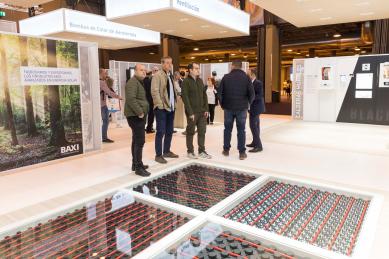

The Air-Conditioning and Refrigeration Sectors Are Making a Strong Comeback
During the C&R 2021 trade fair next 16th to 19th November at IFEMA MADRID, the sectors’ business associations will take stock of the situation and changing market trends.
According to AFEC figures, turnover in the air conditioning business topped 1,200 million in 2019, and in 2020 it exceeded initial forecasts despite the difficulties and uncertainties.
AEFYT points out that, in recent years up to 2019, the refrigeration sector recorded growth of between 7-15%, with a turnover of over €5,000 million, 22,000 direct jobs and full employment.
FEGECA assures that the domestic hot water and heating market in 2021 is being strongly affected by the wave of building renovation in Europe, which promises very positive prospects.
The International Air Conditioning & Refrigeration Fair, C&R 2021, will take place next 16th to 19th November in IFEMA MADRID. During the Fair, industry associations, including AFEC (Association of Manufacturers of Air Conditioning Equipment), AEFYT (Association of Refrigeration Companies & Technologies) and FEGECA (Association of Generators and Heat Emitter Manufacturers), will take stock of the situation, developments and market trends. These issues cover the economic recovery and future challenges such as the global climate emergency and energy consumption, more sustainable energy consumption and greater use of renewable energy.
The air-conditioning and refrigeration sectors have weathered the general economic crisis caused by coronavirus with determination, and in 2021 they are firmly on the road to recovery. AFEC explains that “after a positive market situation in 2019, turnover topped €1,200 million, maintaining the growth trend with a rise of about 4% over 2018. And in 2020, despite the difficulties and uncertainties, the sector’s performance was better than initially forecast.”
AEFYT indicates that “with the anomalies introduced by Covid, we can say that this sector has evolved positively in recent years because it is essential to the productive economy.” They also remind us that it also supported the economic recovery following the 2008 crisis.
For their part, the chairman of FEGECA (Association of Generators and Heat Emitter Manufacturers) stresses that “Spain’s situation in 2020 was affected by the State of Emergency. Domestic hot water and heating supplies were declared essential. However, the market was strongly affected by the downturn in economic activity caused by the lockdown.” And they add that “the market in 2021 is being strongly influenced by the building renovation wave across Europe, which allows us to be very optimistic about the medium- and long-term prospects.”
Good Air-Conditioning Performance
Marta San Román, Deputy Director of AFEC, explains that, following a positive trend in the air conditioning market, in 2019, market turnover exceeded €1.2 billion, maintaining the growth trend with a rise of around 4% on 2018. “In 2020, and despite the difficulties and uncertainties we experienced, the sector’s performance was better than initial forecasts suggested.” Turnover in the machinery, air distribution and treatment, fans and residential ventilation segments fell by about 6% on the previous year, according to the director of the Air Conditioning Equipment Manufacturers Association.
Which factors will drive the market recovery now? In San Román’s opinion, decarbonisation policies will be a crucial element. “Both the European Union and Spain’s national and regional governments are preparing subsidy mechanisms to facilitate and speed up the sector’s recovery. These policies, with ambitious targets for energy efficiency, use of renewables and emissions reduction, include solutions such as heat pumps and regulation and control as key aspects in the transition to cleaner air conditioning.”
Green NextGenerationEU funds are essential for supporting growth. They have already started in the form of support, for example, for energy renovation. On the other hand, the growing concern for indoor air quality (IAQ) has opened up new avenues for the industry, with increasingly effective and efficient equipment and systems.
In this context, air conditioning equipment manufacturers are constantly evolving their technology, “always against the backdrop of promoting renewable energy use, complying with regulatory and legislative energy efficiency requirements, and promoting digitalisation.” In this regard, “they’re offering increasingly sustainable and environmentally friendly solutions, in line with the different ecodesign regulations, and other legislation such as the Renewable Energy Directive or the Energy Efficiency Directive.”
So AFEC’s Deputy Director notes that “manufacturers are constantly innovating, to further improve the energy efficiency of their equipment. They achieve that using technologies like heat pumps, variable refrigerant flow systems, increasingly advanced components (like compressors, fans, and heat exchangers), and regulation & control systems. All these technologies help in the transition to improvements like greater connectivity and eco-efficient refrigerants. And, of course, certification is essential to ensure that the new developments ensure efficiency.” On the other hand, the different ventilation, air conditioning, and other systems continue to evolve to “contribute to improving indoor air quality, an aspect that has proven to be of great importance in living spaces.”
Positive Trends in the Refrigeration Sector
AEFYT (the Association of Refrigeration Companies & Technologies) says that, with the anomalies introduced by Covid, we could say that this sector has grown in recent years because it is essential to the productive economy and remind us that it also supported the economic recovery that followed the 2008 crisis.
They explain that “except for 2020, when the Covid crisis cut growth, over the last three years (up to 2019) the sector has experienced growth of 7-15%, with a turnover of more than €5,000 million in 2018 and 22,000 direct jobs, and full employment. It also has over 5,000 certified installation companies and more than 200 companies, including manufacturers, consultants, and refrigeration supplies and equipment distributors.
Also, the NextGenerationEU recovery funds can immediately provide a significant boost to the industry and other refrigeration users. “I mean, specifically, the Expression of Interest that AEFYT is leading with the intention of being included in the European funding programme that we’re currently preparing. This sector has the capacity to collaborate in the ecological and digital transformation processes in key sectors, such as the agri-food industry. That’s why we’re carrying out a strategic project for the recovery and industrial and economic transformation of Spain’s refrigeration sector.”
On the one hand, its scope will cover digitalisation, energy efficiency and decarbonisation, and, on the other, implementing more innovative technologies and solutions. “This project brings us together to work towards achieving the objectives in nine components and 17 measures included in the Spanish government’s Recovery, Transformation and Resilience Plan (PNRTR). We understand that this challenge will give the sector a boost and enable it to attract talent and investment.”
The refrigeration sector is involved in the major challenges facing society and the economy. That’s why we’re fully engaged in a profound transformation that includes the move towards energy efficiency with energy-saving equipment using refrigerants with low or zero Global Warming Potential and with leak and malfunction monitoring. “Closely linked to this objective, digital transformation is being fully integrated into refrigeration technologies, which already integrate disruptive technologies like big data, artificial intelligence, blockchain and virtual reality.”
AEFYT’s directors affirm that “we’re fully committed to the 2030 Agenda goals, not only for our sector but also because we are an industry-wide sector that can help companies that together account for over 40% of Spain’s GDP to achieve their own environmental and digitalisation goals.”
Heating & Hot Water
FEGECA (Association of Heat Generator and Emitter Manufacturers) points out that in recent years the heating and domestic hot water sector has undergone a major transformation as a result of energy and climate policy, as well as the commitments made by countries worldwide and, in particular, by the European Union. “The year 2019 was marked by the climate emergency and the firm commitment to join efforts to ensure a fair transition to a new economic system that involves society more, and whose foremost objective is the measures we need to cut atmospheric carbon emissions.”
As they remind us, in 2020, Spain was severely affected by its State of Emergency, “and domestic hot water and heating supplies were declared an essential service to ensure people and industry got the heat they needed.” However, “the market was strongly affected by the downturn in economic activity caused by the lockdown.” Now, in 2021, “the market is heavily influenced by the wave of building renovation in Europe, which gives us very positive medium- and long-term prospects.”
The association’s figures show that Spain’s heating market in 2020 included 227,300 gas heaters, 799,800 electric water heaters, 36,200 heat pumps, 11,600 dedicated domestic hot water heat pumps, 292,100 wall-mounted boilers, 39,500 floor-standing boilers, 86,100 m2 of solar collectors, 282,000 controllers, 1,178,000 radiators (units) and 3,677,000 m2 of underfloor heating.
From now on, the sector’s recovery will depend on developing technologies that allow the installation of highly efficient heating systems and domestic hot water production without sacrificing comfort. “To benefit from new technologies, we need incentives for replacing existing appliances with new, efficient, high-performance equipment. The NextGenerationEU funds are going to drive the recovery of the EU’s economy. In Spain, the government has already approved and launched plans that define where the aid will go.”
FEGECA is busy lobbying the government to stress the importance of heating installations in the whole process of decarbonising buildings. “We are also stressing the need to ensure that schemes not to exclude efficient technologies from their provisions, to ensure that the most technically and economically feasible and efficient system can always be installed.”
In the coming years, the challenges facing the sector will be marked by the global climate emergency, the European Climate and Energy Framework for 2030-2050, more sustainable energy consumption, and a greater proportion of renewable energy sources. In this respect, switching to renewable gas and hydrogen for heating and domestic hot water production systems will be decisive for the sector.
So, “to incentivise replacing obsolete appliances with condensing units would be a simple way to improve energy efficiency by 25%, simply by changing the generator, and cutting environmental CO2 emissions even more, by 35%. To not allocate incentives for replacement goes totally against the much-needed rapid decarbonisation of our energy system. Renewable gas and hydrogen would mean that, in the medium term, these units would use 40% renewable gases.”
Finally, they point out that “funds should be provided for replacing equipment in houses and apartment buildings to improve efficiency and cut greenhouse gas emissions, which are priority objectives for the EU. In the medium term, these units will burn renewable gases and hydrogen with a zero-carbon footprint, which will cut greenhouse gas emissions quickly and economically and encourage the circular economy.”





